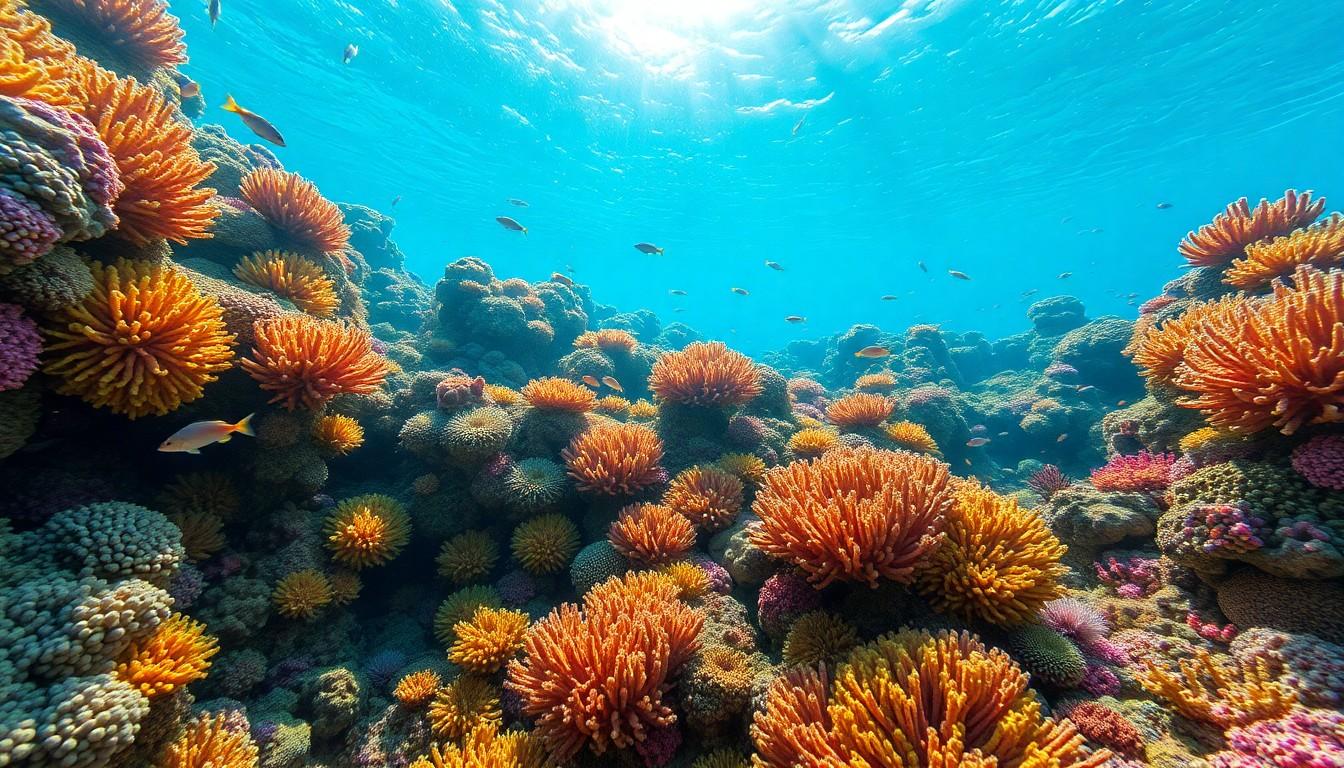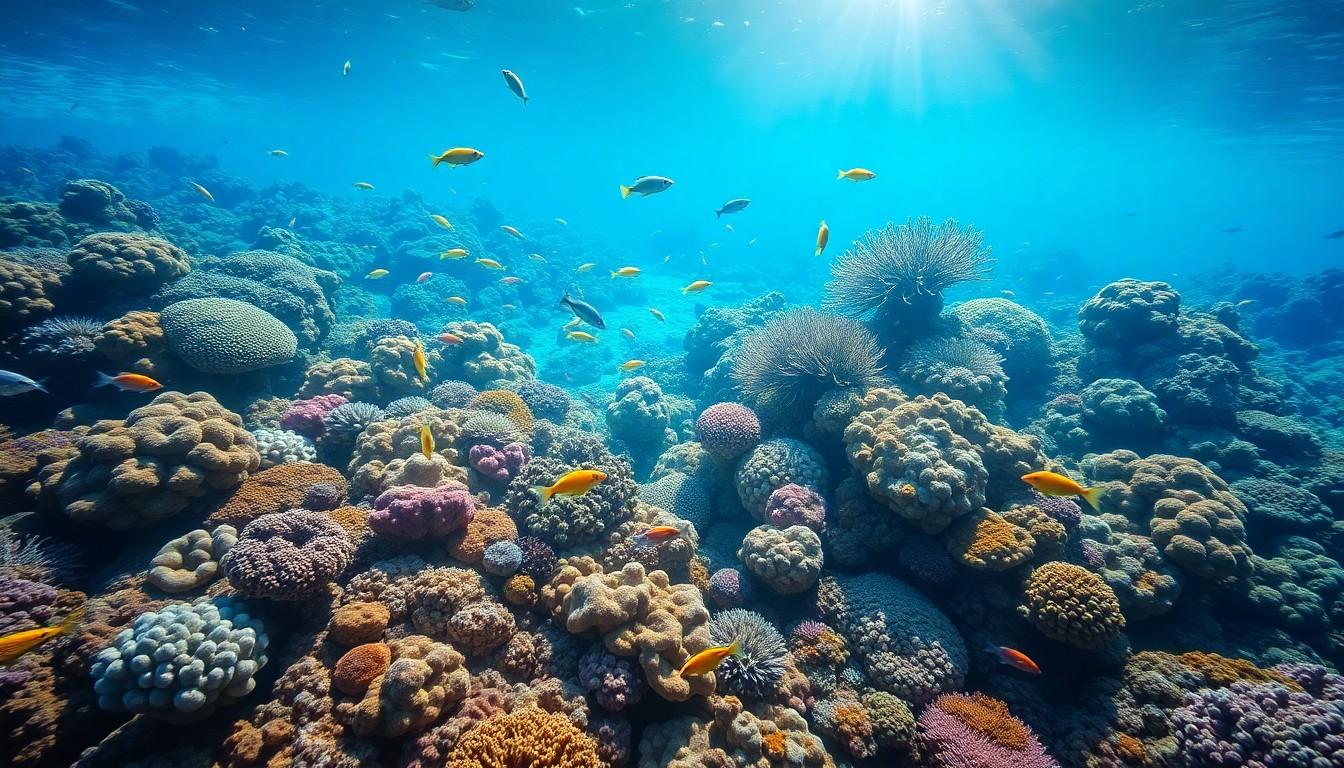Phone:
(701)814-6992
Physical address:
6296 Donnelly Plaza
Ratkeville, Bahamas.

Imagine diving into a vibrant underwater wonderland where colors dance and marine life thrives—welcome to the enchanting world of coral gardens. These underwater ecosystems are like nature’s own art gallery, showcasing stunning coral formations that not only captivate the eye but also play a crucial role in ocean health.
Coral gardens represent vibrant ecosystems, teeming with diverse marine life. These underwater habitats consist of living corals that create intricate structures, providing shelter for numerous species. Fish, invertebrates, and various types of marine flora thrive in these dynamic environments.
Corals play a crucial role in the marine ecosystem by forming reefs that protect coastlines from erosion and storm damage. They also support a vast array of species, highlighting their ecological importance. Numerous studies indicate that coral gardens account for approximately 25% of all marine species, showcasing their biodiversity.
Health indicators for coral gardens include water temperature and quality. Elevated temperatures or pollution can trigger coral bleaching, a significant threat to these ecosystems. According to research, almost 50% of coral reefs worldwide face immediate threats from human activities.
Various regions around the world contain coral gardens. The Great Barrier Reef in Australia, the Red Sea, and the Caribbean Sea are notable examples. Each location displays unique coral species and distinct ecological processes, fostering diverse aquatic life.
Moreover, some coral gardens support sustainable tourism and fishing practices, benefiting local economies. Engaging with these ecosystems emphasizes the importance of conservation efforts. Protecting coral gardens becomes imperative for maintaining marine biodiversity and ocean health.

Coral gardens play a vital role in marine ecosystems and human economies. Their ecological and economic contributions are significant and deserve attention.
Diverse marine species thrive in coral gardens, relying on the structures formed by living corals for habitat and protection. About 25% of all marine species utilize these ecosystems for shelter, which enhances biodiversity. Furthermore, coral gardens stabilize shorelines, effectively reducing erosion and mitigating storm impacts. Healthy coral gardens also improve water quality by filtering pollutants, benefiting surrounding marine life. Research shows that decline in these ecosystems can lead to drastic reductions in fish populations, affecting entire marine food webs.
Coral gardens significantly contribute to local economies through tourism and fishing. Millions of tourists visit coral reefs each year, drawn by their beauty and biodiversity, generating substantial revenue for coastal communities. Sustainable fishing practices in these areas support local livelihoods while minimizing environmental impact. Moreover, coral gardens provide essential resources, such as seafood, which many communities depend on for nutrition and income. Protecting these ecosystems ensures ongoing economic benefits and supports conservation efforts, ultimately benefiting both people and marine life.
Coral gardens fall into two main categories: natural and artificial. Each type plays a significant role in marine ecosystems.
Natural coral gardens develop through complex interactions among coral species, marine organisms, and environmental conditions. These gardens create habitats rich in biodiversity, housing numerous fish and invertebrates. The Great Barrier Reef in Australia showcases many natural coral formations, illustrating the complexity of these ecosystems. Individuals can find various species in these environments, each contributing to overall ecological health. Natural coral gardens thrive when water quality and temperature remain stable, providing ideal conditions for growth. However, these ecosystems are vulnerable to threats like climate change and pollution, emphasizing their fragile existence.
Artificial coral gardens result from human intervention, aiming to restore declining coral populations. Initiatives involve transplanting coral fragments onto degraded areas and utilizing innovative structures to promote coral growth. Many coastal communities implement these gardens to enhance biodiversity and protect shorelines. For example, some projects involve creating reef balls or other purposeful structures that support coral growth and provide habitat for marine life. Such gardens not only help restore ecosystems but also enhance tourism opportunities. Effective management of these artificial habitats can positively impact local economies and strengthen conservation efforts.
Conservation efforts focus on protecting and restoring coral gardens to ensure their survival. Various strategies play a crucial role in maintaining these vibrant ecosystems.
Sustainable fishing practices reduce overfishing pressure on coral gardens. Responsible tourism encourages visitors to respect marine environments while contributing to local economies. Eco-friendly initiatives, such as coral farming, involve cultivating coral species for transplantation into damaged areas. Restoration programs utilize innovative technologies, such as artificial reefs, to enhance biodiversity. Preservation of water quality through pollution control measures is vital for coral health. Incentives for local communities to engage in sustainable practices promote long-term environmental stewardship.
Community involvement fosters collective responsibility for coral garden conservation. Local residents participate in educational workshops to learn about coral ecosystems and their significance. Volunteer programs encourage citizens to engage in coral planting and monitoring efforts. Collaboration with conservation organizations strengthens community resilience against the impacts of climate change. Engaging youth through school programs builds a future generation committed to marine conservation. Active participation in policy advocacy equips communities to influence environmental regulations effectively.
Coral gardens face significant challenges impacting their health and sustainability. Among these, climate change and pollution represent the most pressing threats.
Climate change disrupts the delicate balance within coral gardens. Increased water temperatures lead to coral bleaching, a process that causes corals to expel the symbiotic algae essential for their survival. Research indicates that approximately 50% of coral reefs globally face immediate threats from this phenomenon. Ocean acidification, a result of increased carbon dioxide levels, further impacts calcification processes vital for coral growth. These factors collectively reduce biodiversity and resilience in coral gardens, making them more susceptible to disease and mortality.
Pollution poses a serious risk to coral gardens, originating from various sources such as agricultural runoff, plastic debris, and sewage discharge. Nutrient loading from fertilizers fosters algal blooms, which suffocate corals by blocking sunlight essential for photosynthesis. Approximately 80% of marine pollution stems from land-based activities, exacerbating the degradation of these vital ecosystems. Heavy metals and toxins from industrial waste can also disrupt marine life and coral health. When pollution levels rise, the delicate balance required for thriving coral gardens becomes increasingly difficult to maintain.
Coral gardens represent some of the ocean’s most vital ecosystems. Their vibrant beauty and crucial role in marine biodiversity cannot be overstated. As threats like climate change and pollution continue to escalate, the urgency for conservation becomes increasingly clear.
Investing in sustainable practices and community engagement can help protect these underwater treasures. By fostering a culture of conservation and responsibility, it’s possible to ensure that future generations enjoy the richness of coral gardens. The health of our oceans hinges on the preservation of these ecosystems, making their protection not just a local concern but a global imperative.